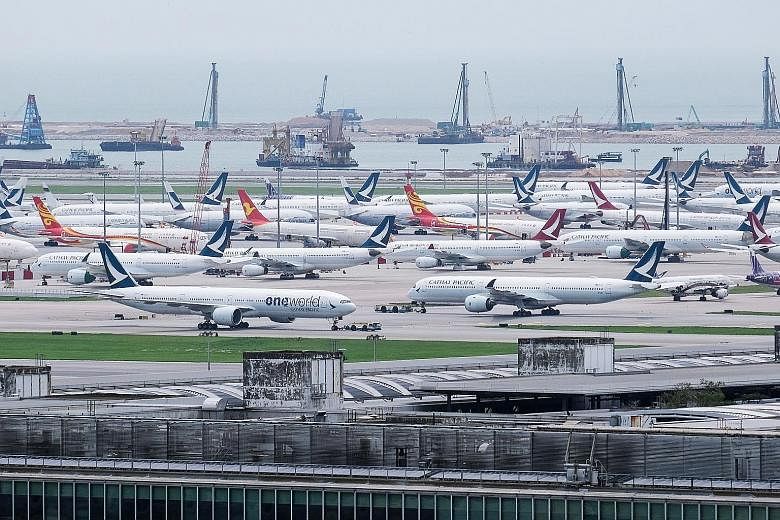Freeing airlines from travel restrictions so they can rebuild their businesses will help the sector recover over the long term better than using taxpayer funds to prop them up, said an industry leader.
Mr Subhas Menon, chief of the Association of Asia Pacific Airlines, told The Straits Times last week that this can be done through strategically easing quarantine curbs and standardising travel precautions.
He credited government support in helping airlines across the region survive the pandemic-induced crisis through less drastic measures such as no-pay leave.
Singapore Airlines, for example, will raise up to $15 billion with support from its majority shareholder, investment company Temasek.
Meanwhile, Hong Kong carrier Cathay Pacific announced a HK$39 billion (S$7 billion) bailout led by the Hong Kong government.
But Mr Menon, who became director-general of the association in March, said: "How long can governments continue to support the airlines and support people's jobs and livelihoods?
"The best thing airlines want to see is for them to fly - to earn their keep on their own merit - so I think the governments will be better off allowing airlines to fly and to open up routes progressively."
This will lead to benefits for the wider economy and social development, Mr Menon added.
The International Air Transport Association (Iata) has said Asia-Pacific carriers are expected to post a loss of US$29 billion (S$40.4 billion) this year, making the region the hardest hit by the Covid-19 pandemic.
While Mr Menon acknowledged that governments were cautious about the risk of a new wave of imported Covid-19 infections, he argued that the easing of travel restrictions can be done safely. "What we are talking about now is to start travel between two countries where the virus is already contained.
"So if you are travelling from a relatively safe environment with very few cases or no cases, to another relatively safe environment with very few cases or no cases, then the risk of imported cases is mitigated.
-
Subhas Menon's career track
-

Singaporean Subhas Menon, 62, took the reins at the Association of Asia Pacific Airlines (AAPA) in March after about 35 years with Singapore Airlines (SIA) Group.
His various roles included chief executive of SilkAir for about three years and SIA's regional vice-president of Europe for six years.
Mr Menon, who is a graduate from the National University of Singapore, is now fronting advocacy and lobbying activities for the 15-member airlines of AAPA.
"This is what we want governments and states to think about, and hopefully they will see the logic of opening these routes."
Mr Menon said the Asia-Pacific is in a good position to ease curbs, given that community transmission has been brought under control in places like Singapore, Hong Kong, Taiwan, New Zealand and Vietnam.
He suggested that the easing of restrictions should ideally be done in accordance with standardised guidelines recommended by the International Civil Aviation Organisation, which proposed measures this month to mitigate specific risk at each point during a trip.
He also reiterated a point made by other aviation stakeholders - that countries should avoid imposing additional measures individually - although states have said such measures were necessary to reduce the risk of Covid-19 transmission.
For example, under the Singapore-China green lane arrangement for essential business travel, a Singapore traveller heading to China will have to take a swab test for the virus before departure. Once in China, another swab test will be taken, as well as one for antibodies, and the traveller must follow a pre-approved itinerary.
After returning to Singapore, he will have to serve a 14-day stay-home notice and undergo another swab test. The traveller will have to pay for these tests, which can cost up to $200 each.
Iata wants Covid-19 testing to be cost-effective and not create an economic or logistical barrier to travel.
Mr Menon conceded that mass travel will need a few years to resume, but noted that there are people who are ready to fly. "Airlines are ready to serve the public. What we need now is help from the governments to lay the runway for the airlines to start operating again and then doing their bit to help travel, tourism, trade and the economy."


